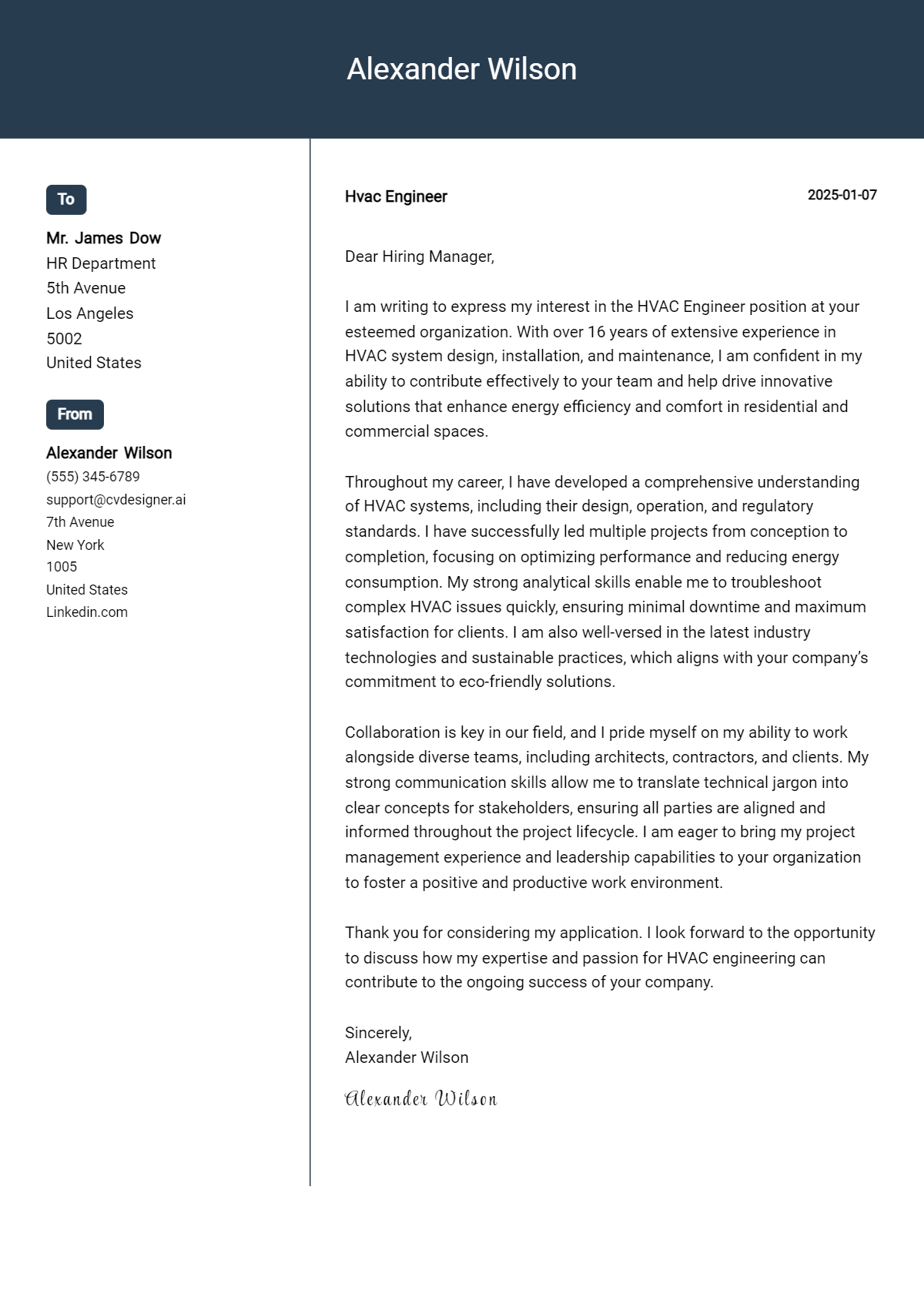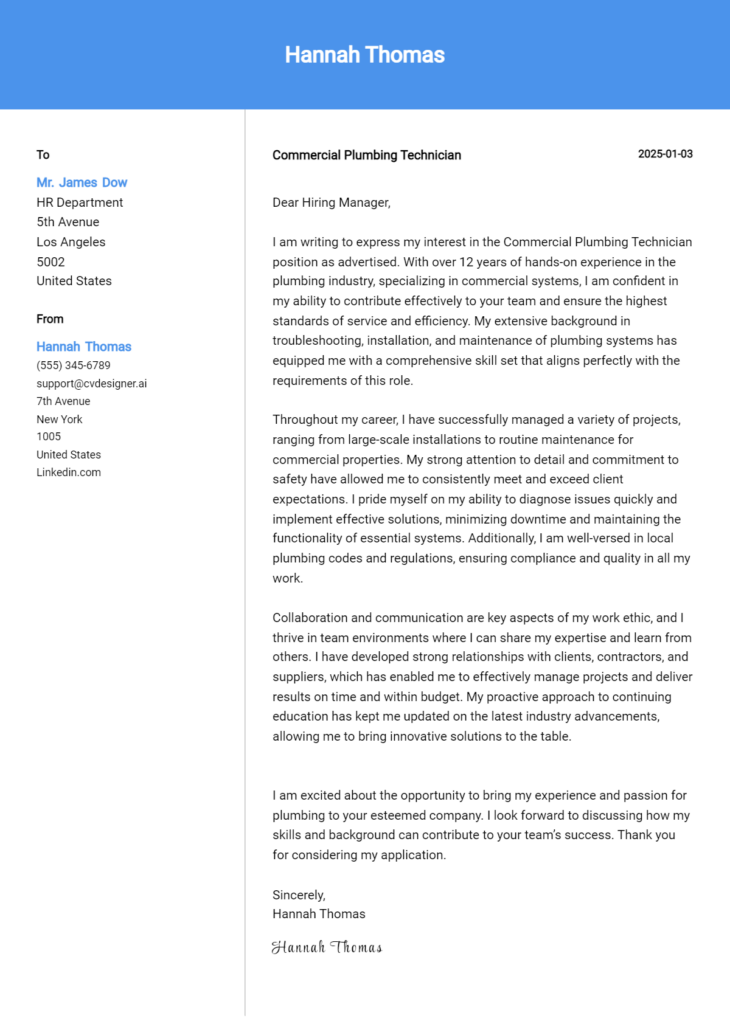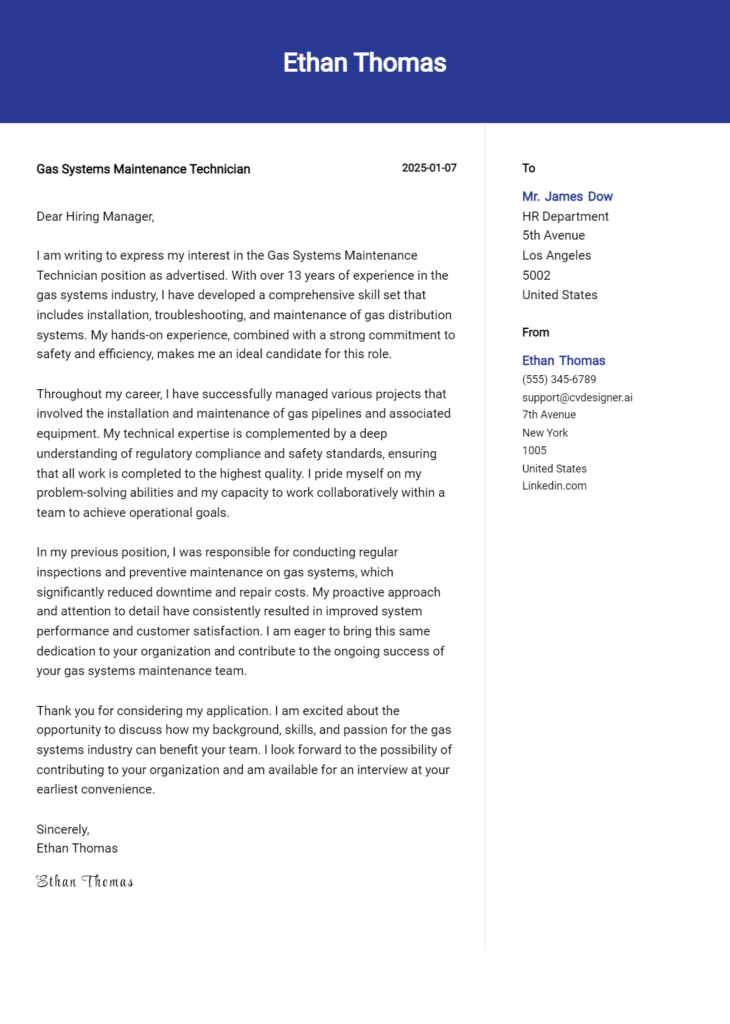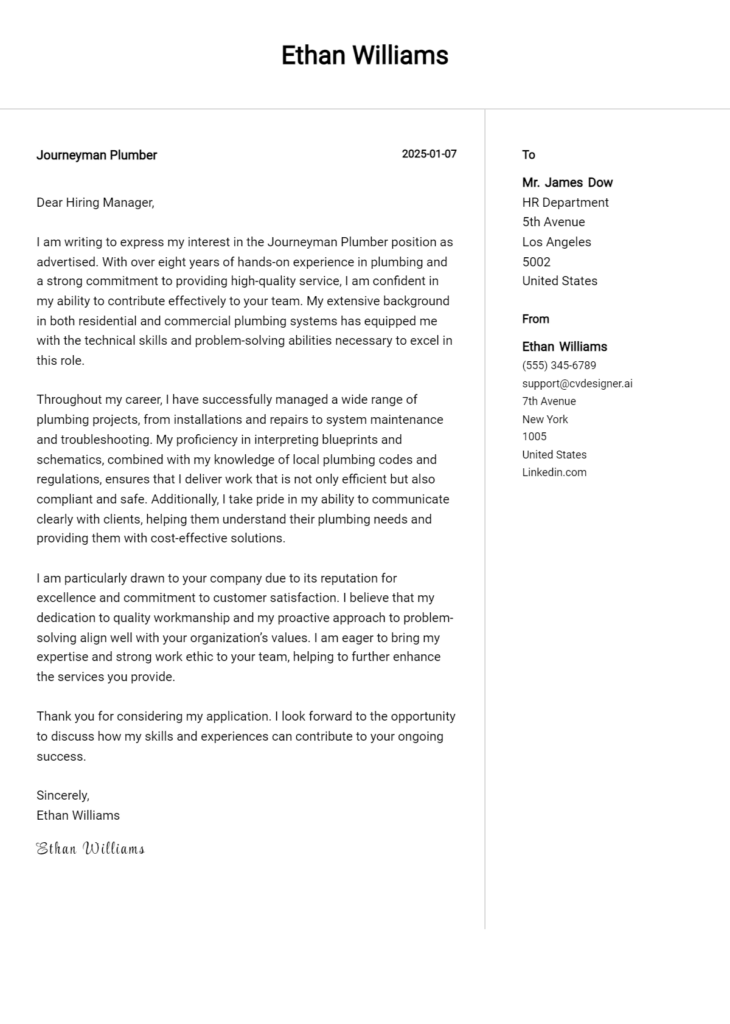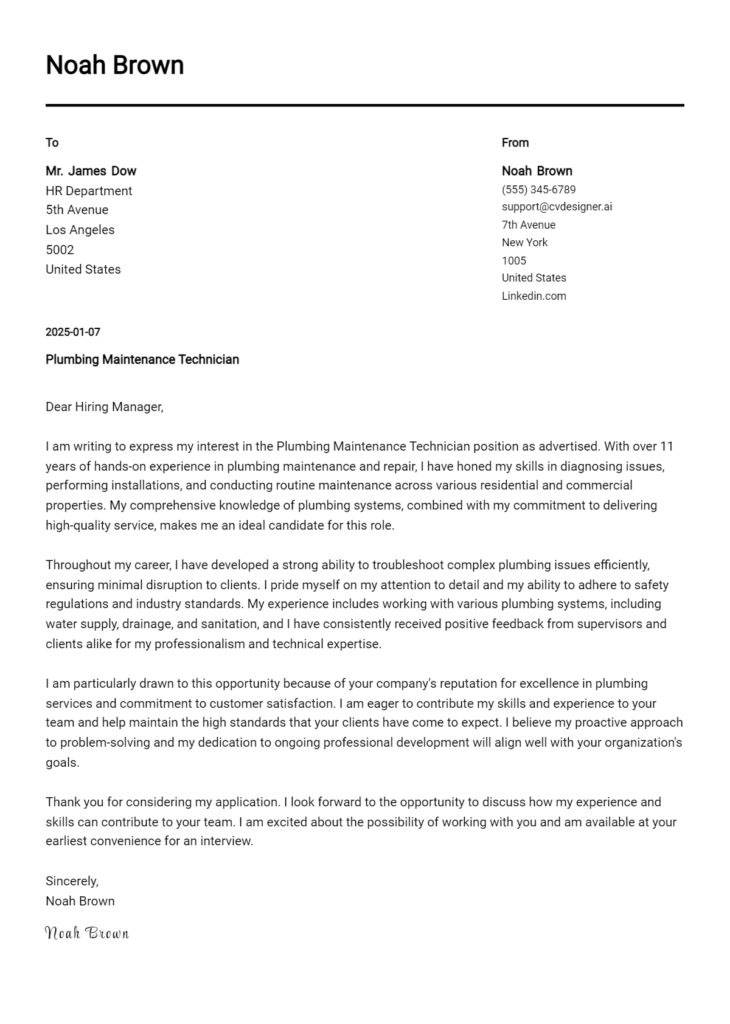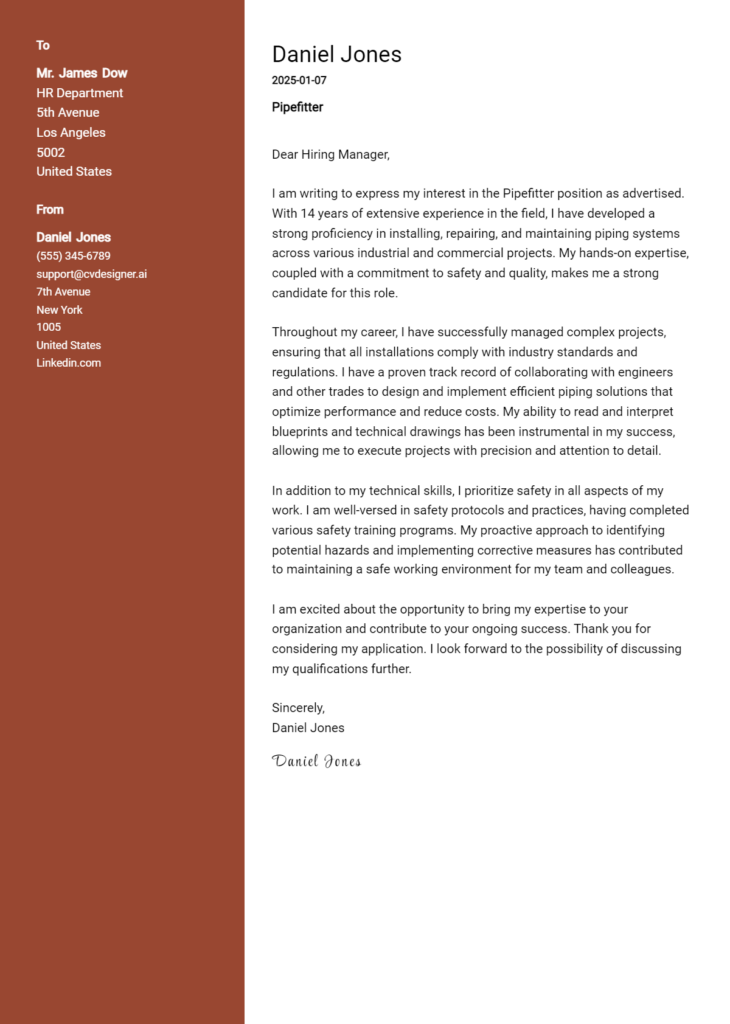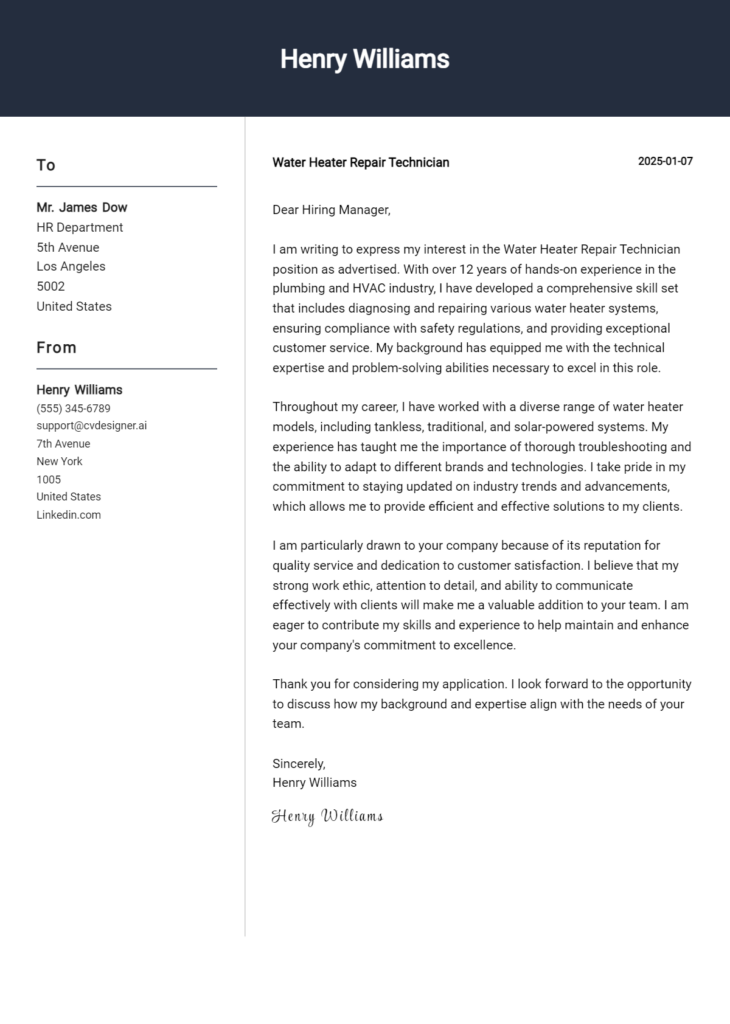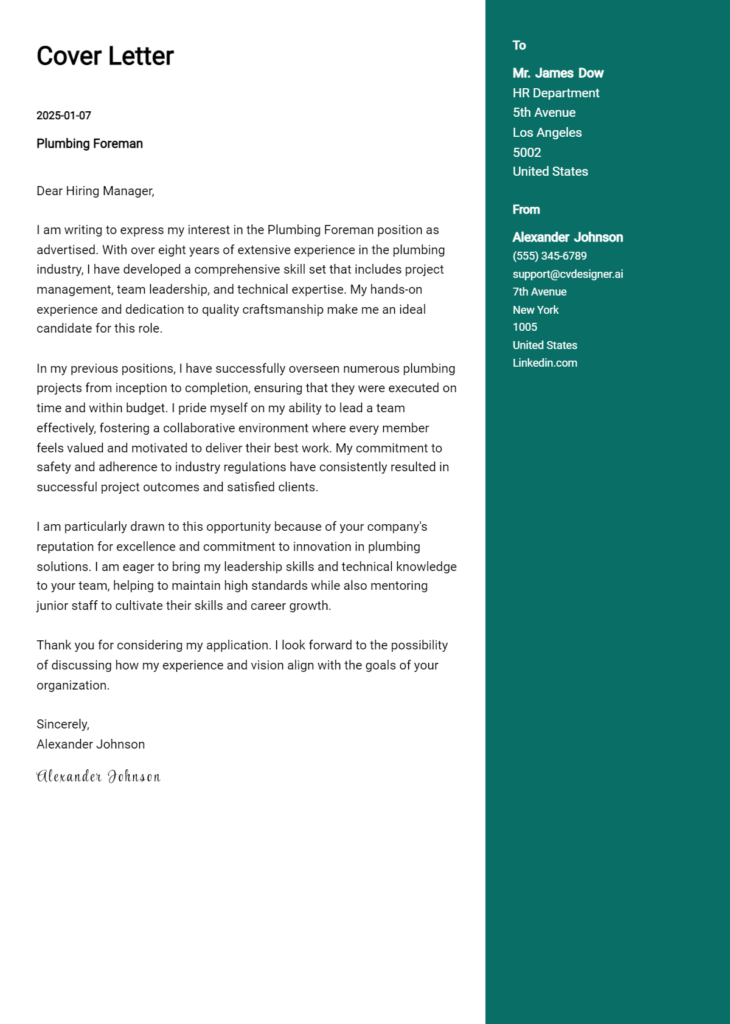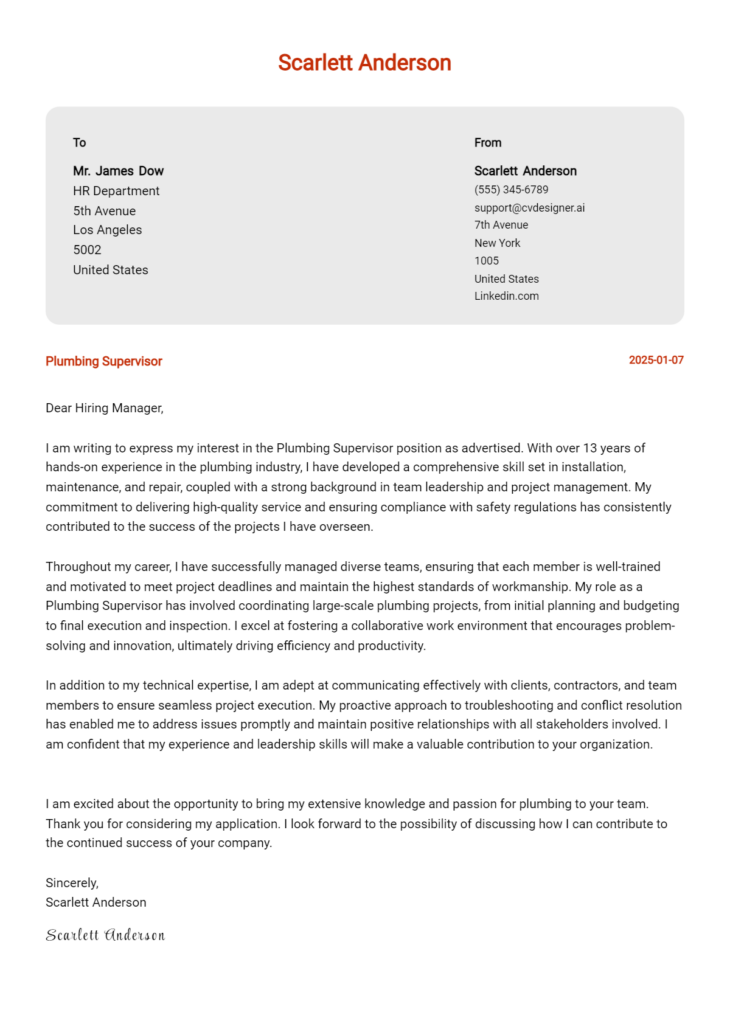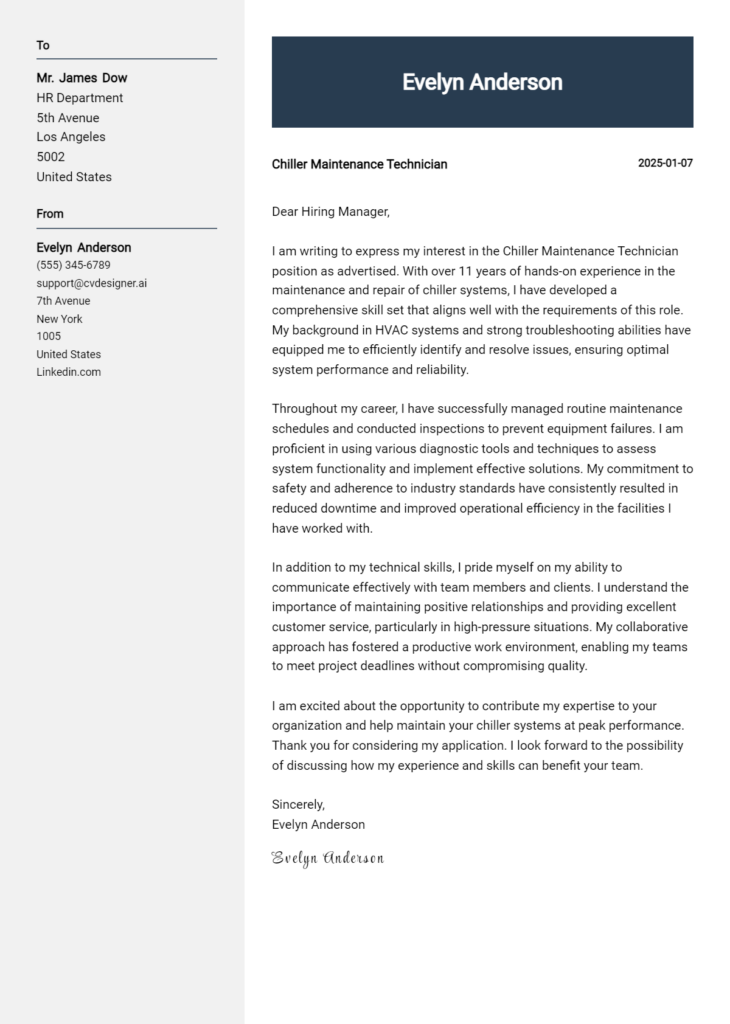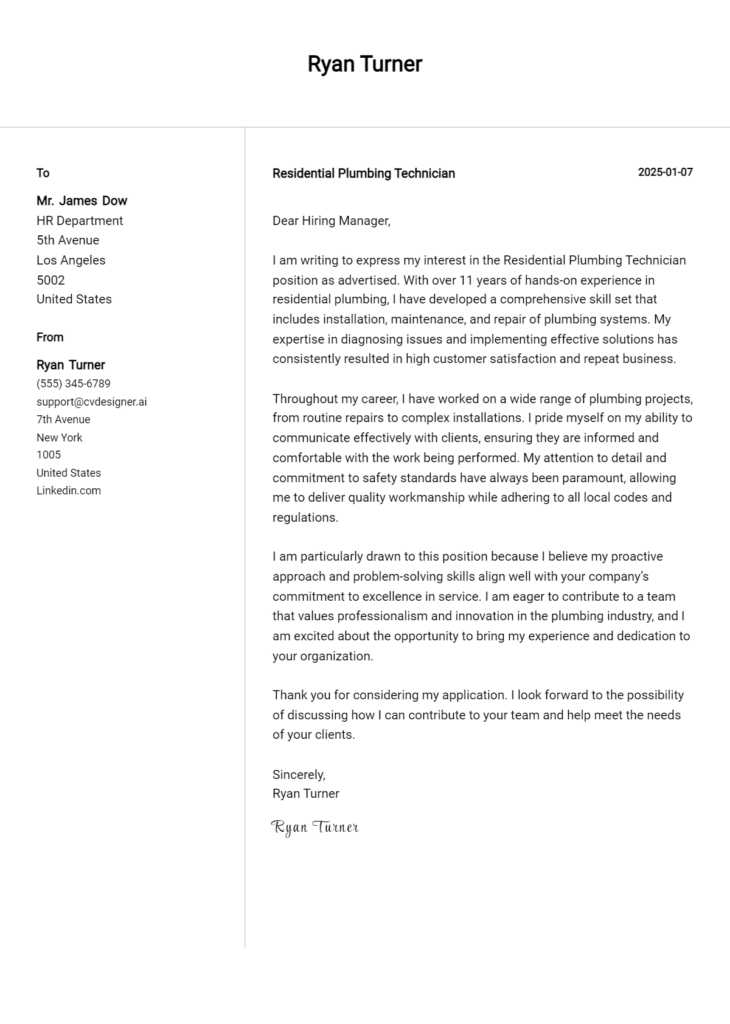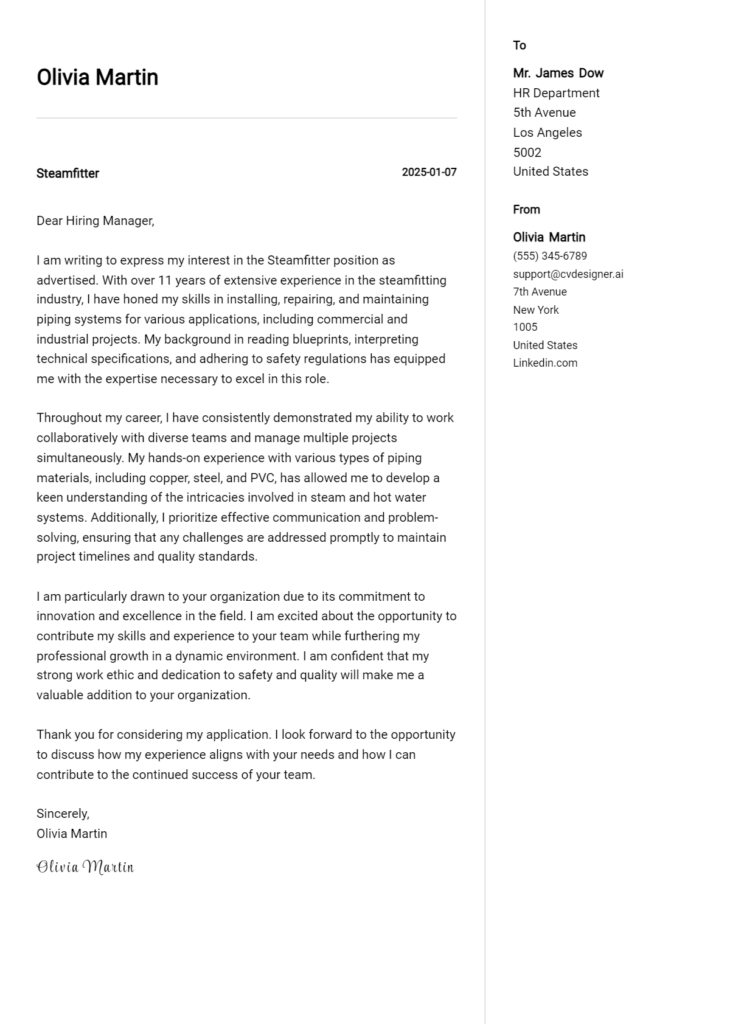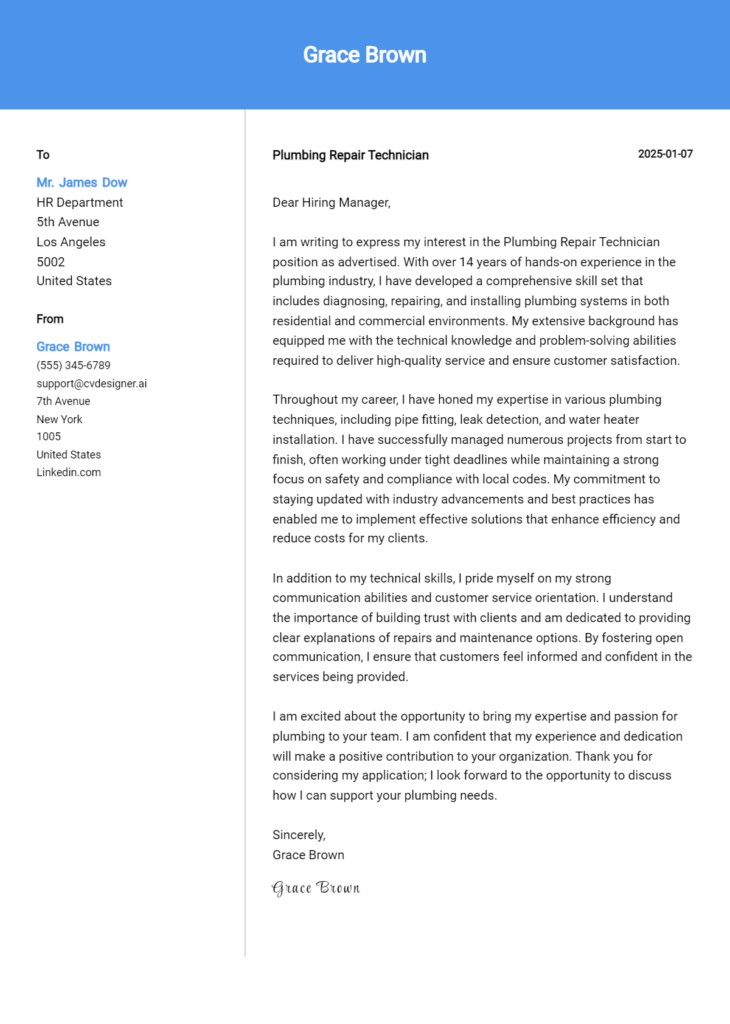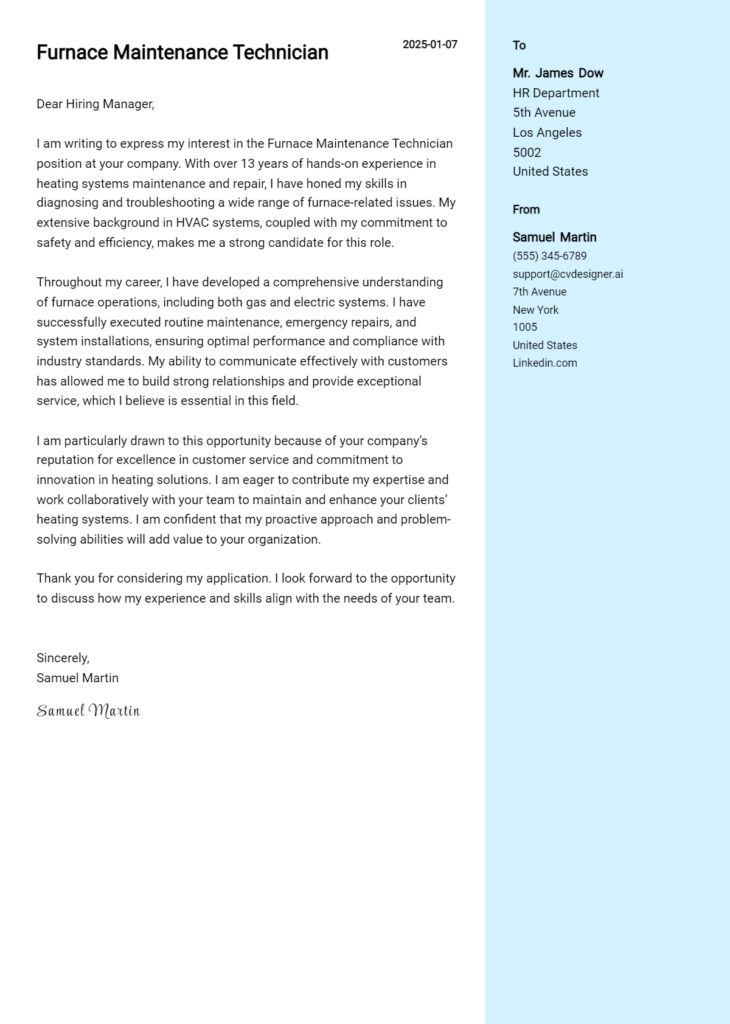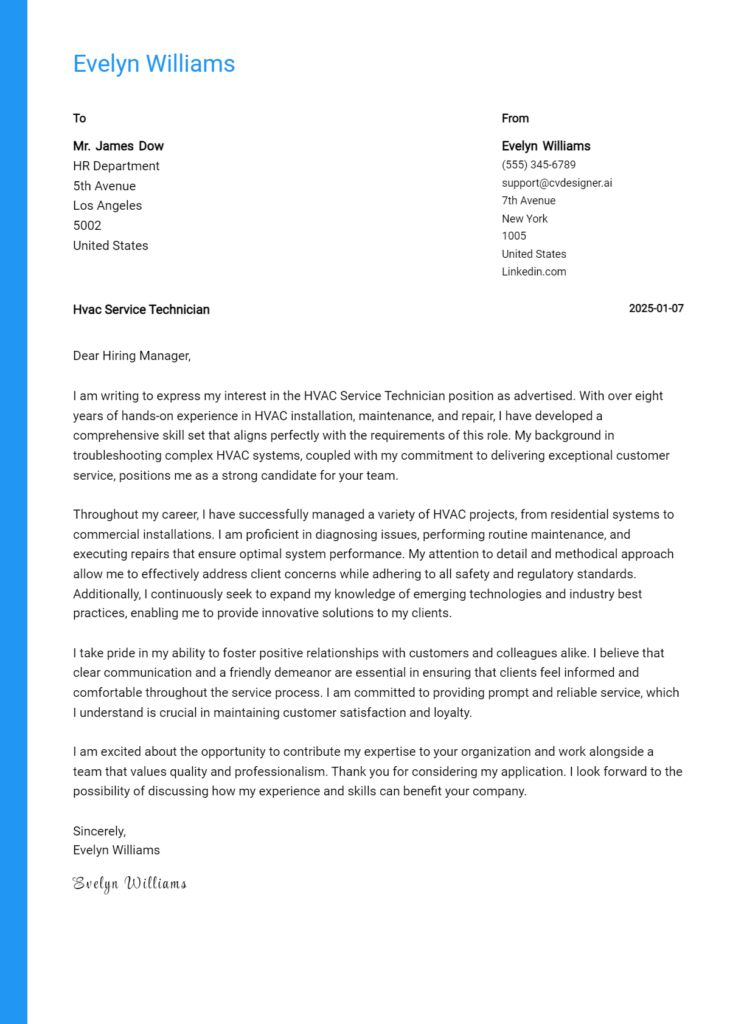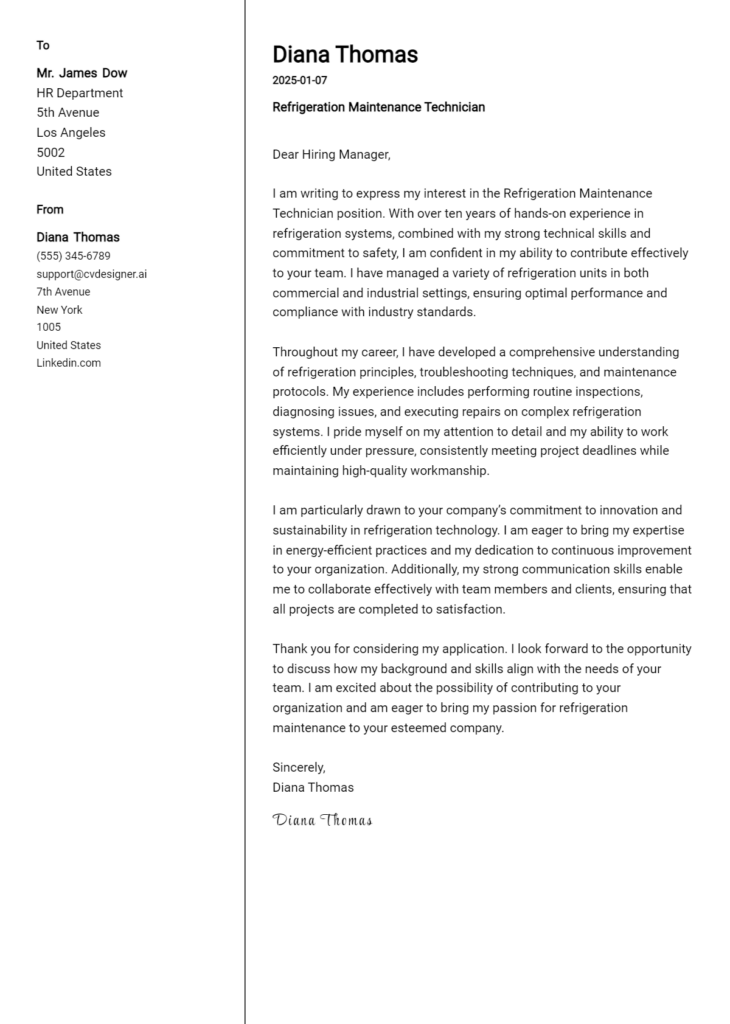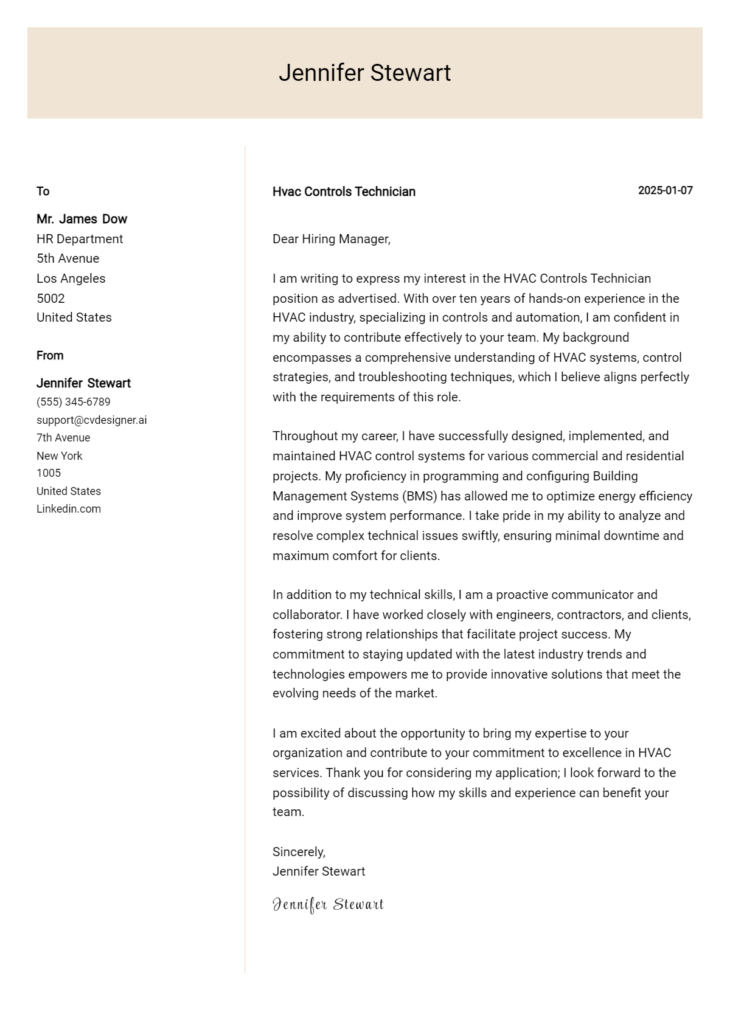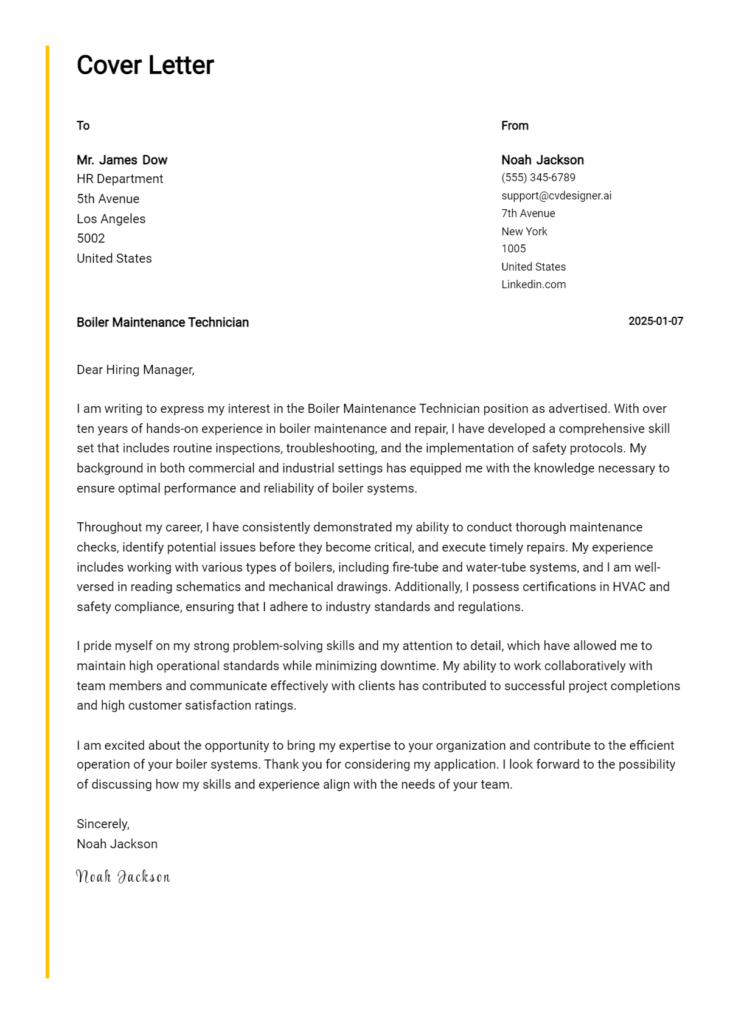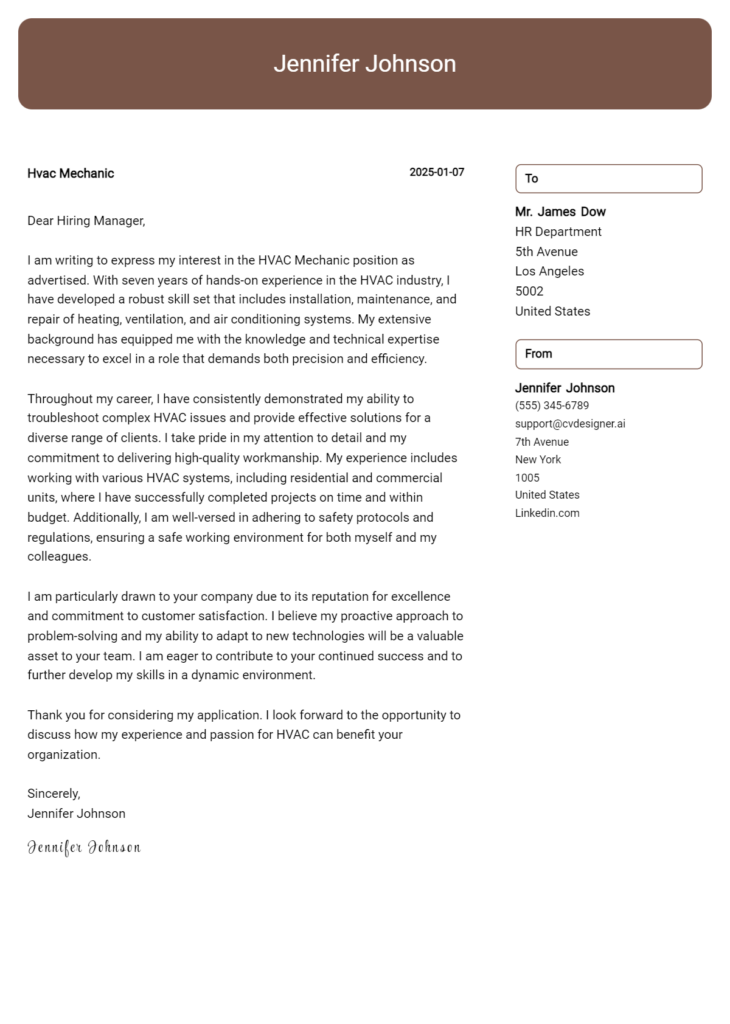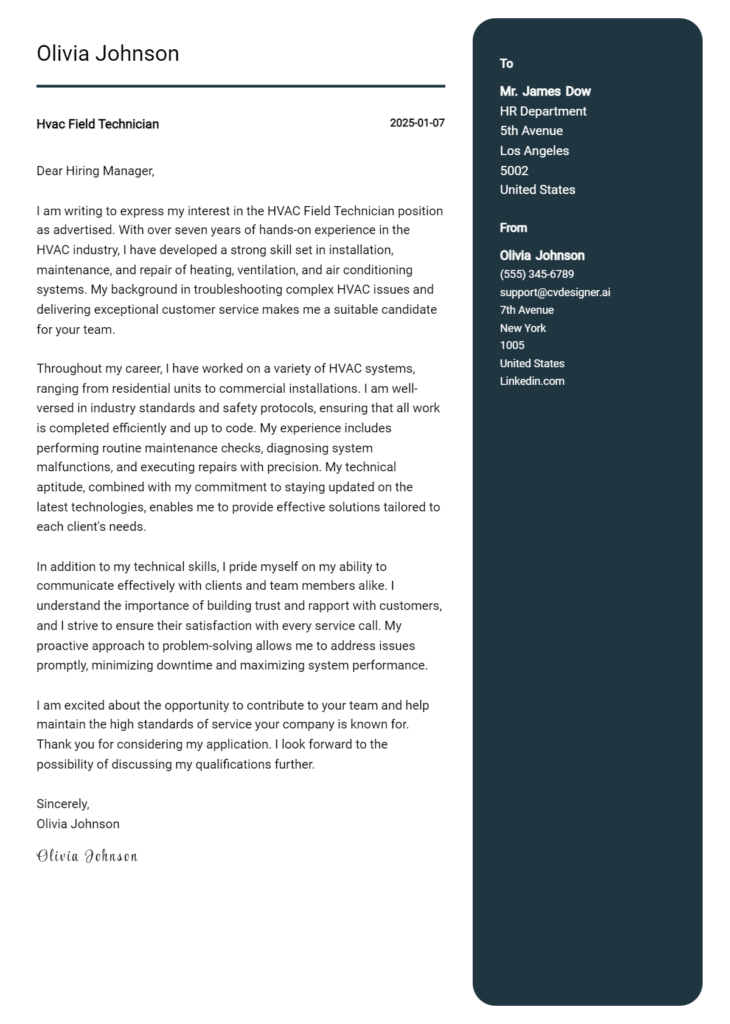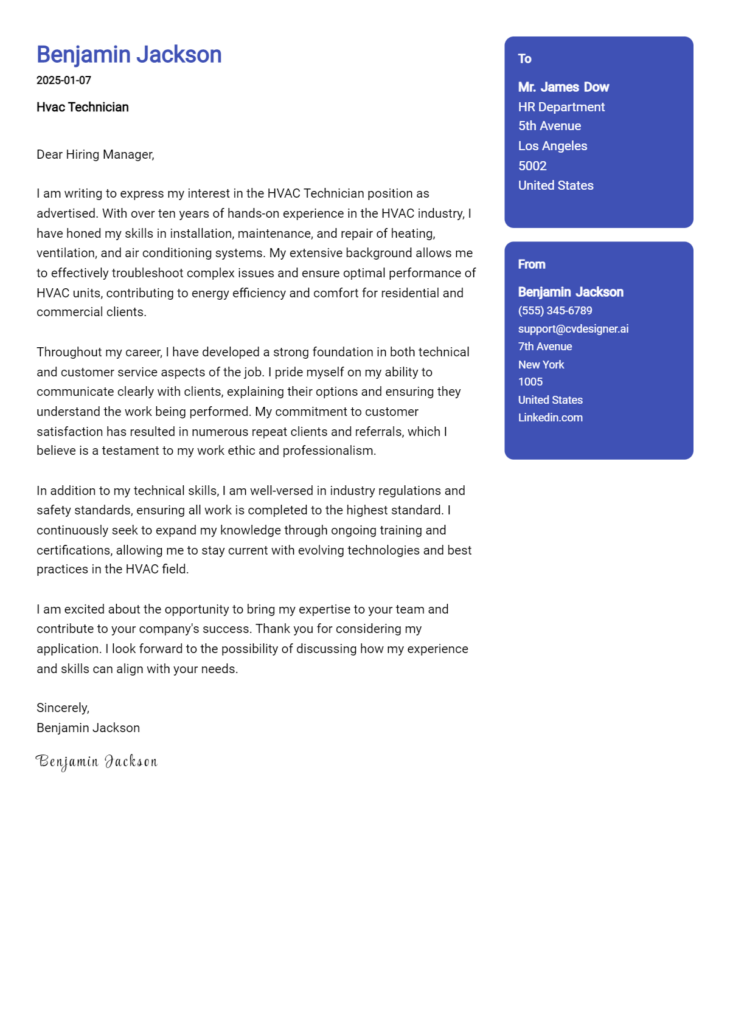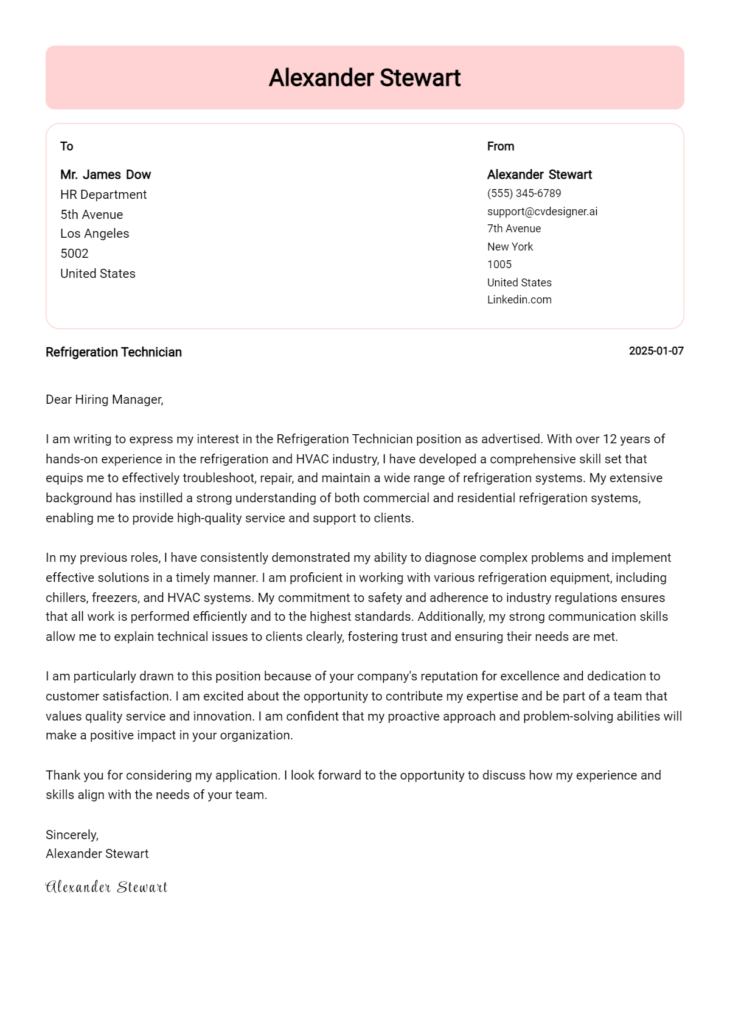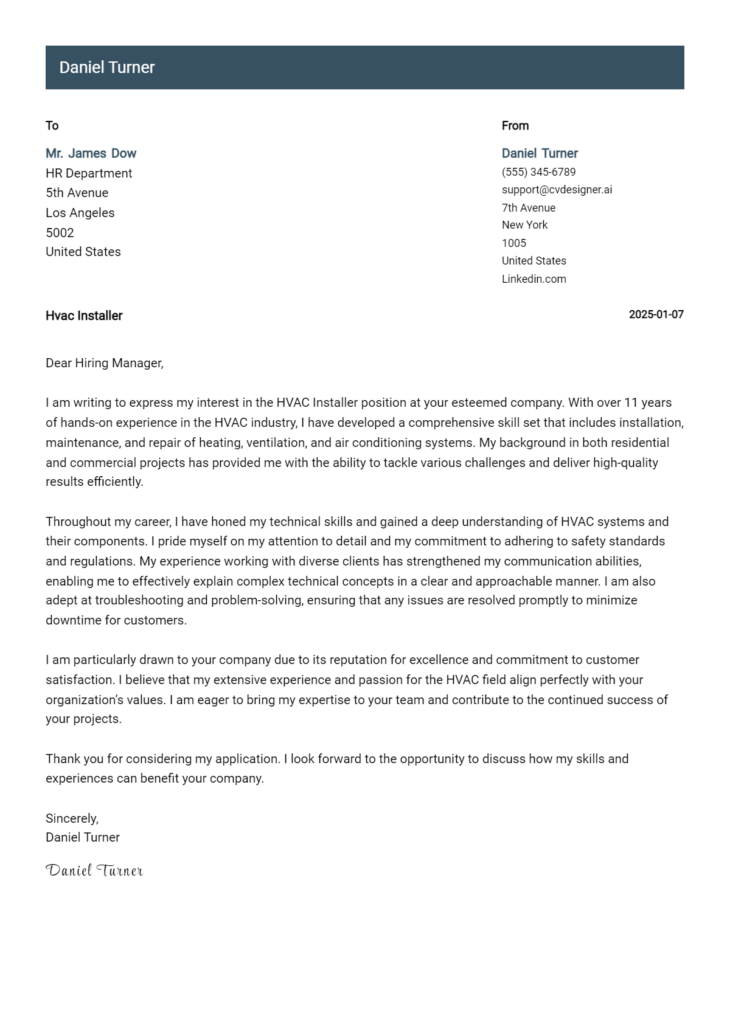Hvac Engineer Cover Letter Examples
Explore additional Hvac Engineer cover letter samples and guides and see what works for your level of experience or role.
How to Format a HVAC Engineer Cover Letter?
Crafting a compelling cover letter is essential for HVAC engineers, as it serves as your first opportunity to showcase your technical expertise and problem-solving skills. The way you format your cover letter not only reflects your professionalism but also demonstrates your ability to communicate clearly and effectively—critical attributes in the HVAC field. A well-structured cover letter captures the hiring manager's attention and sets the tone for your application, making it easier for them to see how your skills align with their needs.
In this guide, we'll outline how to arrange your cover letter, providing insights and HVAC-specific examples to help you create a standout document.
We'll focus on the crucial components of a professional cover letter, including:
- Cover Letter Header
- Cover Letter Greeting
- Cover Letter Introduction
- Cover Letter Body
- Cover Letter Closing
Each section is vital in showcasing your qualifications and dedication to the HVAC profession. Let’s delve into each part and explore how to make your HVAC engineer cover letter shine.
The Importance of a Cover Letter Header for an HVAC Engineer
A well-structured cover letter header is crucial for any HVAC Engineer seeking employment, as it establishes a professional tone and provides essential information at a glance. The header should include your contact information, the date, and the recipient's details. This not only helps the hiring manager identify your application quickly but also sets the stage for the professionalism you bring to the role. Clarity and accuracy in the header reflect your attention to detail, a critical skill in the HVAC industry.
Here are examples of a strong and weak cover letter header for an HVAC Engineer:
Strong Example
John Smith 1234 HVAC Lane Cityville, ST 12345 (123) 456-7890 john.smith@email.com March 1, 2023 Mr. James Johnson Hiring Manager Green Energy Solutions 5678 Eco Drive Cityville, ST 12345
Weak Example
John S. 1234 Lane Cityville 03/01/23 To Whom It May Concern
The Importance of a Strong Cover Letter Greeting for HVAC Engineers
The greeting of your cover letter serves as the first impression you make on the hiring manager, setting the tone for the rest of your application. A well-crafted greeting demonstrates professionalism and showcases your attention to detail, which is crucial in the HVAC engineering field where precision is key. By addressing the hiring manager directly, you personalize your letter, making it more engaging and relevant. To make a strong impact, avoid generic greetings like "To whom it may concern," as they can come across as impersonal. Instead, take the time to research the recipient's name and title, if available, to create a connection. Here are some examples of strong and weak greetings for an HVAC Engineer cover letter:
Strong Greeting Example
Dear Mr. Smith,
Weak Greeting Example
To whom it may concern,
Cover Letter Introduction for HVAC Engineer
A well-crafted cover letter introduction is crucial for an HVAC Engineer as it serves as the first impression to the hiring manager. This introductory paragraph should not only capture attention but also convey genuine interest in the role. By briefly showcasing key skills or notable achievements, the candidate can effectively set the tone for the rest of the letter and differentiate themselves from other applicants. A strong introduction can ignite curiosity about the candidate’s qualifications, while a weak one may result in the hiring manager overlooking the rest of the application.
Strong Example
Dear [Hiring Manager's Name], As a dedicated HVAC Engineer with over eight years of experience in designing and implementing energy-efficient heating and cooling systems, I was thrilled to discover the opening at [Company Name]. My passion for innovative HVAC solutions, combined with my proven track record of reducing energy costs by up to 30% in previous projects, has equipped me with the skills to contribute effectively to your team. I am excited about the opportunity to leverage my expertise to enhance the comfort and efficiency of your clients’ environments.
Weak Example
To whom it may concern, I am applying for the HVAC Engineer position. I have some experience in the field and have worked on various projects. I think I could do a good job if hired.
Purpose of the Cover Letter Body for an HVAC Engineer
The body of a cover letter for an HVAC Engineer serves as a critical opportunity to illustrate the candidate's technical expertise, relevant experiences, and the unique value they can bring to a prospective employer. In this section, candidates should highlight specific projects or accomplishments that demonstrate their ability to design, implement, and maintain efficient HVAC systems. By providing concrete examples, candidates can effectively communicate their problem-solving skills and adaptability in various environments, which are essential traits for success in the HVAC field. A well-crafted cover letter body can significantly enhance a candidate's chances of standing out in a competitive job market.
Strong Example
As an HVAC Engineer with over five years of experience in the industry, I successfully led a team in the design and implementation of a state-of-the-art HVAC system for a large commercial building, resulting in a 30% reduction in energy consumption. Additionally, I played a pivotal role in a project that involved retrofitting existing systems to improve efficiency and reduce operational costs, which saved the client approximately $50,000 annually. My expertise in energy modeling and system optimization, combined with a commitment to sustainable practices, positions me as a valuable asset for your company in navigating the evolving landscape of HVAC technology.
Weak Example
I have worked in HVAC for a few years and have done some projects. I know how to fix and install HVAC systems. I think I would be a good fit for your company. I am a hard worker and I always try my best.
Importance of the Cover Letter Closing for HVAC Engineer
The closing paragraph of a cover letter is critical for HVAC Engineers as it provides a final opportunity to summarize qualifications, express enthusiasm for the role, and prompt the reader to take action, such as reviewing the resume or scheduling an interview. A strong closing reinforces the candidate's fit for the position and creates a sense of urgency for the employer to move forward. Conversely, a weak closing may leave the reader feeling indifferent or uncertain about the candidate's interest.
Strong Example
Thank you for considering my application for the HVAC Engineer position at [Company Name]. With my extensive experience in HVAC system design and my commitment to energy efficiency, I am excited about the opportunity to contribute to your team. I believe my skills and passion align well with the goals of your company. I look forward to discussing my application in more detail and am eager to provide further insights into how I can support your projects. Please feel free to review my resume and contact me to schedule an interview at your earliest convenience.
Weak Example
I hope you think about my application for the HVAC Engineer job. I have some experience and maybe I could be a good fit. It would be nice to hear back from you, and you can look at my resume if you want. Thanks.
These tips will help candidates craft an effective cover letter for an HVAC Engineer position. An impactful cover letter not only highlights your technical skills but also emphasizes your problem-solving abilities, knowledge of the System Development Life Cycle (SDLC), teamwork experience, and passion for continuous learning. By showcasing these key attributes, you can differentiate yourself from other candidates and demonstrate your value to potential employers.
Tips for Writing an Effective HVAC Engineer Cover Letter
Showcase Your Technical Skills
Begin your cover letter by detailing your technical expertise in HVAC systems. Mention specific tools, software, or technologies you are proficient in, such as AutoCAD, Revit, or energy modeling software. Tailor this section to align with the job description, ensuring that you are addressing the specific requirements of the role.Emphasize Problem-Solving Abilities
HVAC engineering often involves troubleshooting and resolving complex issues. Use specific examples from your past experiences to illustrate how you approached and solved technical challenges. Highlight your analytical thinking and decision-making skills, showing potential employers that you can handle difficult situations effectively.Demonstrate SDLC Knowledge
If applicable, mention your understanding of the System Development Life Cycle (SDLC) as it pertains to HVAC projects. Discuss how you've contributed to different phases of a project, from planning and design to implementation and maintenance. This shows your capability to work on comprehensive projects and your familiarity with project management methodologies.Highlight Teamwork and Collaboration
HVAC projects often require collaboration with other engineers, contractors, and clients. Share examples of successful team projects where you played a key role. Emphasize your ability to communicate effectively and work harmoniously in a team setting, which is essential for project success.Express a Passion for Continuous Learning
The HVAC industry is constantly evolving with new technologies and regulations. Convey your enthusiasm for staying updated with industry trends and standards. Mention any certifications, workshops, or courses you've completed recently, or your plans to pursue further education. This demonstrates your commitment to professional growth and adaptability.
For those looking to streamline the process of writing their cover letter, consider using cover letter templates or a cover letter builder to create a polished and professional document.
Common Mistakes to Avoid in a HVAC Engineer Cover Letter
Crafting a compelling cover letter is essential for standing out in the competitive HVAC engineering field. Avoiding common mistakes can significantly enhance your chances of making a positive impression on potential employers. Here are some pitfalls to steer clear of:
Generic Greetings: Using "To Whom It May Concern" can make your letter feel impersonal. Instead, research the hiring manager's name or use a specific title.
Lack of Customization: Failing to tailor your cover letter to the job description can signal a lack of interest. Highlight relevant experiences and skills that align with the specific HVAC position.
Overly Technical Language: While it's important to showcase your expertise, using too much jargon can alienate non-technical readers. Aim for clarity and balance technical details with accessible language.
Ignoring Formatting Guidelines: A poorly formatted cover letter can be off-putting. Follow a clear cover letter format to ensure your document is easy to read and professionally presented. Learn more about cover letter format here.
Repetition of Resume: Your cover letter should complement your resume, not reiterate it. Use this opportunity to elaborate on key achievements or explain gaps in your employment history.
Neglecting Proofreading: Spelling and grammatical errors can undermine your professionalism. Always proofread your cover letter multiple times or ask someone else to review it before submission.
Weak Closing Statements: Ending your cover letter without a strong closing can diminish its impact. Make sure to express enthusiasm for the position and include a call to action, inviting the employer to contact you for an interview.
By steering clear of these common mistakes, you can create a compelling cover letter that effectively showcases your qualifications as an HVAC engineer. For inspiration, check out these cover letter examples to help you craft your own winning document.
Cover Letter FAQs for HVAC Engineer
What should I include in my cover letter as an HVAC Engineer?
In your cover letter, you should start with a strong opening that introduces yourself and states the position you are applying for. Highlight your relevant experience in HVAC systems, including installations, maintenance, and troubleshooting. Discuss your technical skills, such as proficiency in HVAC software, understanding of building codes, and knowledge of energy efficiency practices. Be sure to mention any certifications, such as EPA Section 608, and relevant education. Additionally, convey your problem-solving abilities and teamwork skills, as HVAC projects often require collaboration. Finally, express your enthusiasm for the position and the company, and include a call to action, inviting the hiring manager to discuss your application further.
How can I tailor my cover letter to a specific HVAC job?
To tailor your cover letter to a specific HVAC job, start by carefully reviewing the job description. Identify the key skills and experiences the employer is seeking. Use this information to craft your cover letter, emphasizing your qualifications that align directly with the requirements. Incorporate relevant keywords from the job posting, but ensure the language flows naturally. Mention specific projects or accomplishments that relate to the responsibilities of the role. If the company has a particular focus, such as sustainable solutions or commercial HVAC systems, align your experiences with that focus. Personalizing your cover letter demonstrates your genuine interest in the position and helps you stand out from other applicants.
How long should my cover letter be as an HVAC Engineer?
Your cover letter should ideally be one page long, consisting of three to four paragraphs. Each paragraph should have a clear focus: the introduction, your relevant experience and skills, specific achievements, and a closing statement. Aim for concise and impactful sentences, ensuring every word adds value to your application. While it's important to provide enough detail to showcase your qualifications, avoid unnecessary fluff or overly technical jargon that could confuse the reader. Keep in mind that hiring managers often skim cover letters, so clarity and brevity are key. A well-structured cover letter that fits within this length will make it easier for the employer to quickly grasp your qualifications.
Should I include technical skills in my HVAC Engineer cover letter?
Absolutely! Including technical skills in your HVAC Engineer cover letter is essential, as these competencies are crucial for the role. Clearly list your technical proficiencies related to HVAC design, installation, and maintenance, such as familiarity with specific systems (like VRF, chillers, or HVAC controls) and software tools (like AutoCAD or HVAC load calculation software). Additionally, emphasize your understanding of industry standards and regulations, such as ASHRAE guidelines or local building codes. By showcasing your technical expertise, you provide concrete evidence of your qualifications, which can set you apart from other candidates. Just remember to balance technical details with soft skills like communication and teamwork, as these are equally important in collaborative environments.
Build your Cover Letter in minutes
Use an AI-powered cover letter builder and have your letter done in 5 minutes. Just select your template and our software will guide you through the process.

